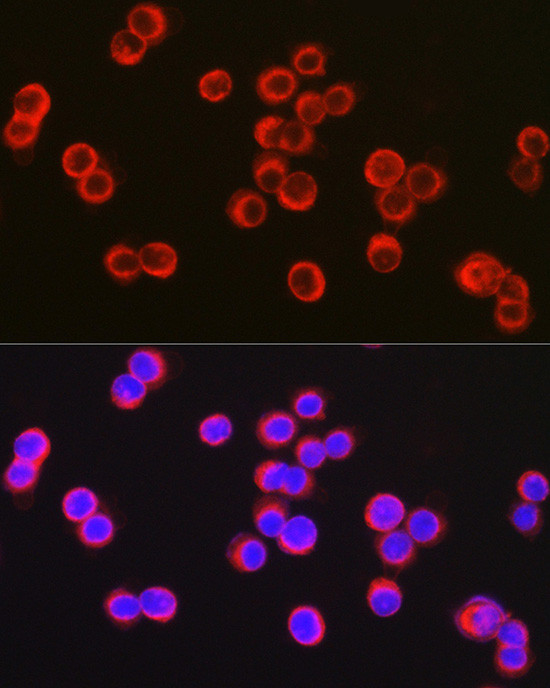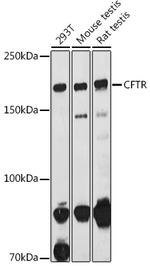Search Thermo Fisher Scientific
Product Details
PA5-121193
Species Reactivity
Host/Isotype
Class
Type
Immunogen
Conjugate
Form
Concentration
Purification
Storage buffer
Contains
Storage conditions
Shipping conditions
RRID
Product Specific Information
Positive test controls include: 293T, Mouse testis, Rat testis. The target is usually found in the following locations: Cell membrane, Early endosome membrane, Multi-pass membrane protein.
Immunogen sequence: SILNPINSIR KFSIVQKTPL QMNGIEEDSD EPLERRLSLV PDSEQGEAIL PRISVISTGP TLQARRRQSV LNLMTHSVNQ GQNIHRKTTA STRKVSLAPQ ANLTELDIYS RRLSQETGLE ISEEINEEDL KECFFDDMES I
Target Information
Cystic Fibrosis (CF) is a common lethal genetic disease caused by mutations of the gene coding for the cystic fibrosis transmembrane conductance factor, a cAMP regulated chloride channel. Approximately 70% of all CF cases share the deletion of a phenylalanine at position 508 (delta F508) which results in abnormal chloride transport. Since the CF mutation is lethal, most often by lung and liver disease, it raises the question of why this genetic disease remains as common as it is. One possible explanation is that Salmonella typhi has been shown to use CFTR to enter intestinal epithelial cells and that delta F508 heterozygote and homozygote mice showed 86% and 100% reductions in S. typhi intestinal submucosal uptake.
For Research Use Only. Not for use in diagnostic procedures. Not for resale without express authorization.
References (0)
Bioinformatics
Protein Aliases: ATP Binding Cassette Superfamily C Member 7 (ABCC7); ATP-binding cassette sub-family C member 7; ATP-binding cassette transporter sub-family C member 7; ATP-binding cassette, subfamily c, member 7; cAMP-dependent chloride channel; CFTR; Channel conductance-controlling ATPase; Cystic fibrosis transmembrane conductance regulator; cystic fibrosis transmembrane conductance regulator (ATP-binding cassette sub-family C, member 7); cystic fibrosis transmembrane conductance regulator homolog; cystic fibrosis transmembrane conductance regulator homolog; ATP-binding cassette, subfamily c, member 7; tcag7.78; TNR CFTR
Gene Aliases: ABC35; ABCC7; AW495489; CF; CFTR; CFTR/MRP; dJ760C5.1; MRP7; RGD1561193; TNR-CFTR
UniProt ID: (Human) P13569, (Mouse) P26361, (Rat) P34158
Entrez Gene ID: (Human) 1080, (Mouse) 12638, (Rat) 24255

Performance Guarantee
If an Invitrogen™ antibody doesn't perform as described on our website or datasheet,we'll replace the product at no cost to you, or provide you with a credit for a future purchase.*
Learn more
We're here to help
Get expert recommendations for common problems or connect directly with an on staff expert for technical assistance related to applications, equipment and general product use.
Contact tech support


